2024 Guide to Lab-Grown Diamonds: Everything You Need to Know
July 25, 2024
Lab-grown diamonds are changing the jewelry industry in 2024. These gems offer a more affordable and sustainable option for diamond lovers. Lab-grown diamonds are chemically and physically identical to natural diamonds but are created in controlled lab settings.

We’ve seen a big rise in the popularity of lab-grown diamonds over the past few years. They’re now available in many jewelry stores and online shops. More people are choosing them for engagement rings and other special pieces.
Buying a lab-grown diamond is different from buying a natural one. There are new things to think about, like the growing process and certification. We’ll guide you through what to look for when shopping for these modern gems.
Key Takeaways
- Lab-grown diamonds are real diamonds created in labs, not mined from the earth
- These gems are becoming more popular due to lower costs and eco-friendly production
- When buying lab-grown diamonds, look for proper certification and consider the growing process
What Are Lab-Grown Diamonds?

Lab-grown diamonds are gemstones created in controlled settings using advanced technology. They have the same physical and chemical properties as natural diamonds. Let’s explore how these diamonds are made and the different types available.
Defining Lab-Grown Diamonds
Lab-grown diamonds are real diamonds created in a lab instead of mined from the earth. We call them synthetic diamonds or cultured diamonds too. They have the same carbon structure as natural diamonds.
These diamonds look just like mined diamonds. Even experts need special tools to tell them apart. Lab diamonds have the same hardness, brilliance, and fire as natural ones.
The main difference is their origin. Natural diamonds form deep in the earth over millions of years. Lab diamonds grow in weeks or months in special machines.
Creation Process of Lab-Grown Diamonds
We use two main methods to grow diamonds in labs:
- High Pressure-High Temperature (HPHT)
- Chemical Vapor Deposition (CVD)
HPHT mimics how diamonds form in nature. It uses high pressure and heat to turn carbon into diamonds. CVD uses a low-pressure chamber filled with carbon-rich gas. The gas turns into diamond crystals on a starter seed.
Both methods produce high-quality diamonds. The process takes a few weeks to a few months. This is much faster than the millions of years needed for natural diamonds to form.
Types of Lab-Grown Diamonds
Lab-grown diamonds come in various types:
- Colorless diamonds: These look like traditional white diamonds.
- Colored diamonds: We can create rare colors like blue, pink, and yellow.
- Rough diamonds: Uncut stones used for industrial purposes.
- Polished diamonds: Cut and shaped for jewelry.
We can also grow diamonds in different sizes and shapes. Common cuts include round, princess, oval, and cushion.
Lab diamonds have the same grades as natural ones. We use the 4Cs (cut, color, clarity, and carat) to rate their quality.
Related Article: 2024 Guide To Buying Custom Engagement Rings In Dallas
Comparing Lab-Grown vs. Natural Diamonds
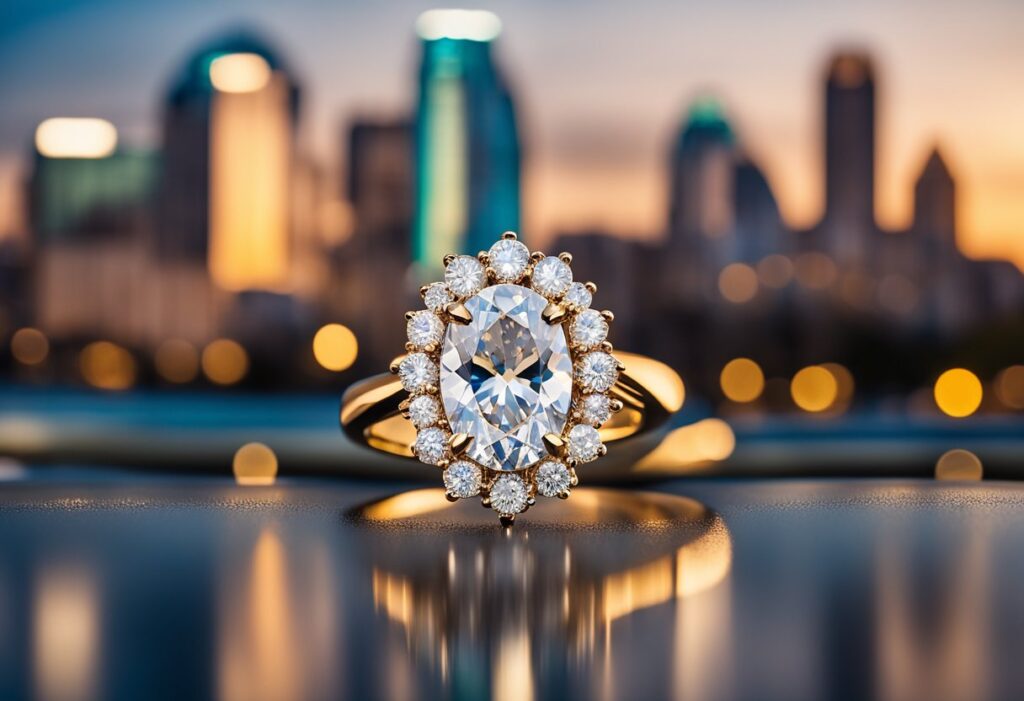
Lab-grown and natural diamonds have key differences in their origins, pricing, and environmental impact. We’ll explore how these two types of diamonds stack up across visual, cost, and sustainability factors.
Visual Similarities and Differences
Lab-grown and natural diamonds look nearly identical to the naked eye. Both types have the same crystal structure and optical properties. This makes them sparkle and reflect light in the same way.
Expert gemologists use special tools to spot tiny differences. Lab diamonds may have slight color zoning or growth patterns. Natural diamonds often have tiny flaws called inclusions.
Under magnification, lab diamonds might show faint traces of their growth process. But for everyday wear, most people can’t tell them apart visually.
Price Comparison
Lab-grown diamonds cost 30-40% less than natural diamonds of similar quality. This price gap is due to differences in production and supply.
Natural diamonds take billions of years to form and are mined from the earth. This makes them rarer and more expensive. Lab diamonds are grown in weeks, lowering their cost.
Here’s a quick price comparison for 1-carat diamonds:
- Lab-grown: $2,000 – $3,500
- Natural: $4,000 – $6,000
The exact prices vary based on cut, color, and clarity. But lab diamonds offer big savings across all grades.
Environmental Impact
Lab-grown diamonds have a smaller environmental footprint than mined diamonds. Growing diamonds uses less energy and water than mining.
Diamond mining can disturb ecosystems and wildlife habitats. It may also lead to soil erosion and deforestation. Lab diamond production avoids these issues.
Some key environmental differences:
- Carbon emissions: Lab diamonds produce about 1/7th the carbon emissions of mined diamonds.
- Water use: Growing diamonds uses up to 70% less water than mining.
- Land impact: Lab production doesn’t require digging up large areas of land.
Many lab diamond makers use renewable energy, further cutting their impact. This makes lab-grown an appealing choice for eco-conscious buyers.
Market Trends for Lab-Grown Diamonds

Lab-grown diamonds are seeing rapid growth and changing consumer preferences. We expect this trend to continue as technology improves and awareness increases.
Recent Growth in the Market
The lab-grown diamond market has boomed in recent years. Sales have jumped by over 20% annually since 2020. More jewelers now offer these stones as a popular choice.
Consumers are drawn to lab diamonds for several reasons:
• Lower prices (30-40% less than mined diamonds) • Eco-friendly production • Guaranteed conflict-free sourcing • Identical look and quality to natural diamonds
Big brands like Pandora have fully switched to lab-grown for their diamond jewelry. This shift has helped drive wider market acceptance.
Predictions for Future Trends
We see strong growth ahead for lab diamonds. Experts predict the market will keep expanding by 15-20% each year through 2030.
Key factors shaping future trends:
• Improved growing techniques • Larger, higher-quality stones • More color options beyond white diamonds • Growing millennial and Gen Z interest • Increased use in industrial applications
As production scales up, prices may drop further. This could make lab diamonds even more appealing to budget-conscious shoppers.
We also expect more luxury brands to embrace lab-grown options. This will likely boost the stones’ prestige and desirability.
Related Article: Why Oval Diamonds Are Popular In Dallas, TX
Buying Guide for Lab-Grown Diamonds

When shopping for lab-grown diamonds, it’s important to know how to pick the right stone, where to buy it, and how to verify its quality. We’ll cover the key things to look for and consider.
How to Choose the Right Diamond
The 4 Cs are key when picking a lab-grown diamond: cut, color, clarity, and carat weight. Cut affects sparkle and shine. Color ranges from D (colorless) to Z (light yellow). Clarity measures tiny flaws. Carat refers to the diamond’s weight.
We suggest prioritizing cut quality for maximum brilliance. GIA Excellent or AGS Ideal cuts offer the best light performance. For color, G-H grades look colorless to the naked eye but cost less than D-F.
For clarity, VS1-VS2 grades offer a good balance of quality and value. Flaws aren’t visible without magnification. Carat size is personal preference, but 1-1.5 carats are popular for engagement rings.
Shape also impacts price and appearance. Round brilliants are classic, while fancy shapes like oval or cushion offer unique looks.
Where to Purchase Lab-Grown Diamonds
Many jewelers now offer lab-grown diamonds alongside natural ones. Online retailers often have larger selections and competitive prices. Some top options include:
- Blue Nile
- Brilliant Earth
- Clean Origin
- James Allen
- With Clarity
When buying online, look for:
- HD videos/images of actual diamonds
- Return policies (30+ days ideal)
- Certification from reputable labs
- Customer reviews
- Secure payment options
Local jewelers may offer in-person viewing and custom designs. Chain stores like Kay and Zales carry lab-grown options too.
We recommend comparing prices across multiple sellers. Lab-grown prices can vary widely.
Certification and Appraisal
Third-party certification is crucial for lab-grown diamonds. It verifies the stone’s qualities and origin. Top grading labs include:
- IGI (International Gemological Institute)
- GIA (Gemological Institute of America)
- GCAL (Gem Certification & Assurance Lab)
The certificate should list the 4Cs, measurements, and growth method (CVD or HPHT). Some also include light performance analysis.
An appraisal determines the diamond’s monetary value. This is useful for insurance purposes. Many jewelers offer free appraisals with purchase.
We suggest getting the diamond re-appraised every few years. Lab-grown diamond prices are changing rapidly as technology improves.
Care and Maintenance

Lab-grown diamonds need proper care to keep them looking their best. Regular cleaning and careful handling will help maintain their beauty for years to come.
Long-Term Maintenance
We recommend cleaning lab-grown diamonds at home every few weeks. Use warm water, mild soap, and a soft brush to gently scrub away dirt and oils. Rinse thoroughly and dry with a lint-free cloth.
Avoid harsh chemicals and ultrasonic cleaners, as they may damage some lab-grown diamonds. Store your jewelry in a fabric-lined box or pouch to prevent scratches.
Have a professional jeweler inspect and clean your lab-grown diamond jewelry once or twice a year. They can check for loose settings and wear.
Remove your jewelry before swimming, exercising, or doing housework. This prevents damage from impacts or chemicals.
Repair and Insurance Options
If your lab-grown diamond jewelry gets damaged, take it to a qualified jeweler for repair. Many can fix minor issues like loose stones or bent prongs.
For major damage, contact the original seller. They may offer repair services or replacements under warranty.
We suggest insuring valuable lab-grown diamond pieces. Many homeowners or renters insurance policies cover jewelry. You can also get separate jewelry insurance.
Keep your purchase documents and get regular appraisals. This helps with insurance claims if your jewelry is lost or stolen.
Some jewelers offer lifetime warranties or care plans. These can cover routine maintenance and some repairs.
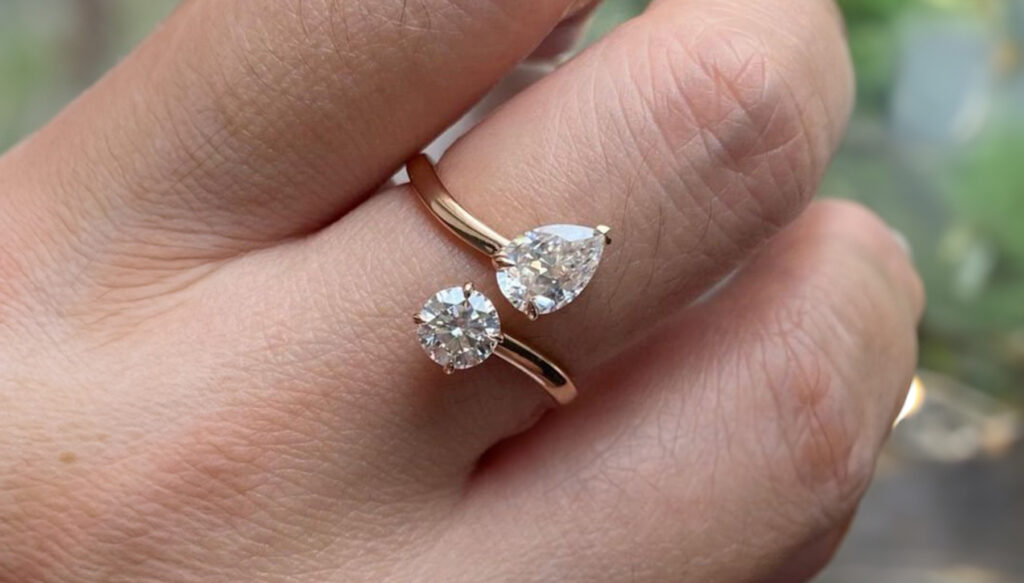
When searching for the perfect engagement ring in Dallas, many couples are turning towards custom options to find a piece that truly represents their unique relationship. In Dallas, custom engagement rings have always been , offering future spouses the chance to participate in the creation of their own one-of-a-kind symbol of love. Custom engagement rings allow for a personal touch that goes beyond the selection of a standard band and stone; it’s about tailoring every detail to suit the wearer’s style and preference.
The journey to creating a custom engagement ring in Dallas starts with understanding what customization truly means. It involves selecting the right jeweler, one who listens to your vision and has the expertise to bring it to life. The process is a collaborative effort that may include the choice of metals, the cut, color, clarity, and carat of the diamond or other precious stones, and the design of the setting. With an array of skilled jewelers in Dallas, finding the perfect fit for your custom ring needs requires research and a clear idea of your desires.
Key Takeaways
- Custom engagement rings offer a personal touch that reflects the couple’s unique relationship.
- The creation process involves collaboration with a jeweler to choose details like metal, stones, and design.
- Research and clarity about your preferences are essential in finding the right jeweler in Dallas.
Understanding Custom Engagement Rings
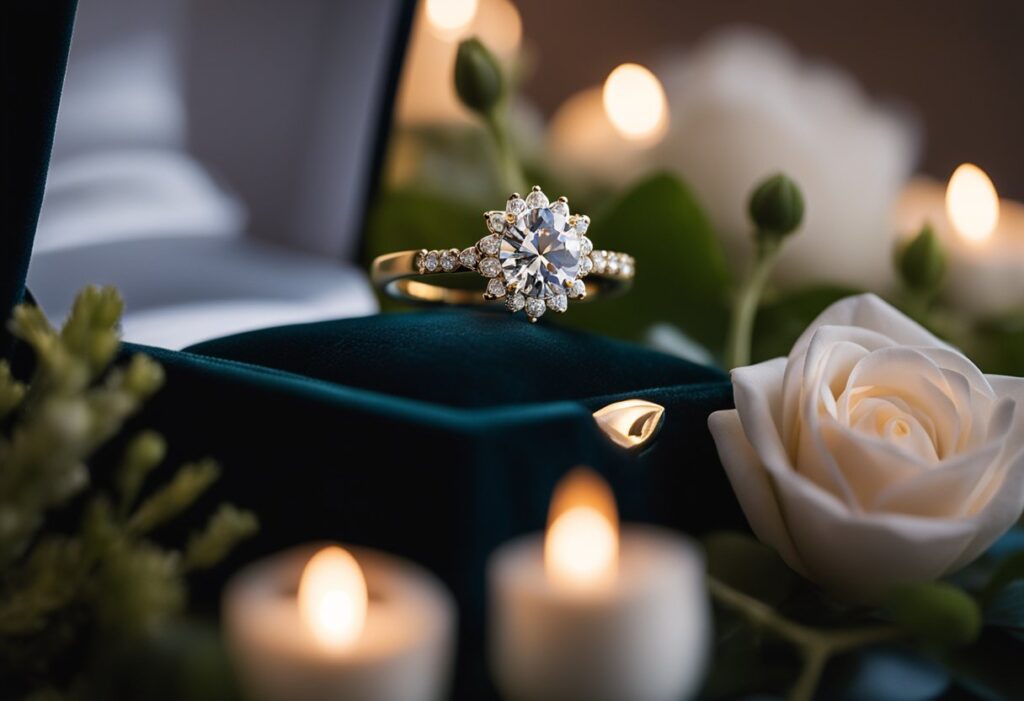
Custom engagement rings represent a personal touch in the journey of love. We understand that each detail reflects your unique story, and here’s how you can ensure each aspect of your ring is perfect.
The Art Of Customization
When we talk about the art of customization, it is all about personal expression and crafting a ring that encapsulates the essence of your relationship. It involves choosing elements that represent your personal style and values. By working closely with a jeweler such as Dallas Custom Engagement Rings, we can incorporate individual ideas and preferences into the design.
Choosing The Right Metal
Choosing the right metal is crucial for both the ring’s aesthetic and longevity. We commonly consider metals such as gold, platinum, and palladium for their durability and timeless look. With gold, we have options like yellow, rose, and white, each offering a different vibe. Platinum stands out for its strength and naturally white sheen, which showcases diamonds brilliantly.
Selecting The Perfect Diamond
Selecting the perfect diamond involves understanding the Four Cs: Cut, Color, Clarity, and Carat weight. These characteristics determine the diamond’s quality and beauty. We work to find the right balance that fits both taste and budget, leaning on expert advice and guidance from industry specialists like those outlined in the 2024 guide by Dallas Diamond Factory. See Why are Oval Diamonds so popular in Dallas, TX.
Ring Design Fundamentals
Understanding ring design fundamentals is essential. The design should complement the wearer’s hand, and we can consider aspects such as the ring’s profile, the setting style, and whether to include additional diamonds or gemstones. The setting can range from a simple solitaire to an intricate halo or pave design, and it should secure the diamond while enhancing its natural beauty.
How To Find A Jeweler In Dallas
In our pursuit of the perfect custom engagement ring, it’s essential to navigate the vibrant jewelry landscape of Dallas with precision. We’ll address finding credible jewelers, understanding their expertise, and working with them to create a bespoke symbol of love.
Researching Local Jewelers
When we start our search, it’s crucial to explore a diverse range of jewelers. We might begin by checking out Dallas Diamond Factory known for their custom engagement rings, to get a feel for the high-end offerings in Dallas. Their private jeweler experiences provides excellent diamond education and a personalized approach in ring selection. As we gather information, we should look beyond the sparkle and delve into each jeweler’s history, collection, and customer feedback.
Evaluating Craftsmanship And Reputation
Attention to detail and skill in design are what set apart master jewelers. We seek out those who not only have a reputation for excellence but also showcase transparent craftsmanship standards. For example, Dallas Diamond Factory emphasizes the importance of educating customers about the intricacies of cut, color, clarity, and carat. Meanwhile, we must not overlook the testimonials from satisfied patrons and the breadth of custom work featured, as these are indicators of a jeweler’s standing in the community and dedication to quality.
Related Article: Custom Engagement rings for Dallas Couples
Consultation And Collaboration Process
Our final step involves reaching out and setting up a consultation. Establishing a line of communication with jewelers such as Dallas Diamond Factory, renowned for their personalized service, helps us assess how well they collaborate with clients to bring visions to life. During these interactions, we should discuss our ideas, budget, and timeline to ensure they align with the Dallas jeweler process and policies. It’s during this phase we cement our partnership and set the stage for creating a custom engagement ring that speaks to our unique love story.
The Purchase Process
As a custom engagement ring first time buyer navigating the path to purchasing custom engagement rings in Dallas, we focus on three main aspects: creating a realistic budget, understanding the timeline involved, and learning about payment and insurance options. These segments are crucial to ensure a smooth and stress-free acquisition.
Budgeting For Your Ring
To start, we suggest setting a clear budget that reflects your financial situation and priorities. Engagement rings can vary dramatically in cost, influenced by factors like diamond quality, design complexity, and metal choice. Remember that custom designs may carry a premium due to their personalized nature. Here are steps to help budget effectively:
- Determine the maximum amount you are willing to spend.
- Allocate funds for the main components: the stone(s), setting, and band.
- Reserve a portion of your budget for potential extras, such as warranties or engravings.
Know Your Timeline
Custom rings require a significant amount of time for design and crafting. Important milestones in the timeline include:
- Initial consultation and design: can take several weeks to finalize.
- Production phase: varies based on complexity, typically several weeks to a few months.
- Revisions or adjustments: additional time post-production if needed.
Plan accordingly, especially if the ring is needed for a specific date, and always inquire about expedited services if time is a constraint.
Payment And Insurance Options
For payment, jewelers in Dallas may offer a variety of options including:
- Full upfront payment: often with a discount incentive.
- Payment plans: a deposit followed by regular payments until completion.
It’s essential to also consider insurance for your engagement ring. Options include:
- Jewelry insurance policies: typically cover loss, theft, and sometimes damage.
- Riders on homeowner’s policies: added specifically for valuable jewelry.
Make sure to clarify the terms, what’s covered, and the process for claims before finalizing your purchase. Be aware that some insurance policies might require an appraisal, so check if your jeweler provides this service.
After Your Purchase
Once you’ve selected the perfect custom engagement ring in Dallas, it’s essential to safeguard your investment. We’ll guide you through the vital steps of care and maintenance, as well as outline the warranty and repair services you should expect.
Proper Care And Maintenance
To ensure that your engagement ring remains as stunning as the day you purchased it, regular cleaning and inspection are key. We recommend the following:
- Cleaning: Gently scrub your ring with a soft toothbrush and a solution of mild soap and warm water. Do this at least once every two months.
- Storage: When not worn, store your ring in a fabric-lined jewelry box away from other jewelry to prevent scratches.
- Professional Check-Ups: Have your ring checked by a professional jeweler annually to ensure the setting is secure and the stones remain in good condition.
Warranty And Repair Services
A comprehensive warranty should accompany a quality custom engagement ring. Look for coverage that includes:
- Accidental Damage: Many jewelers offer repair or replacement for accidental damage.
- Maintenance Services: Some warranties may cover routine maintenance like prong tightening or band re-polishing.
Our Advice: Always keep your purchase documentation in a safe place, as it often contains warranty details and is required for any repair claims.
Frequently Asked Questions
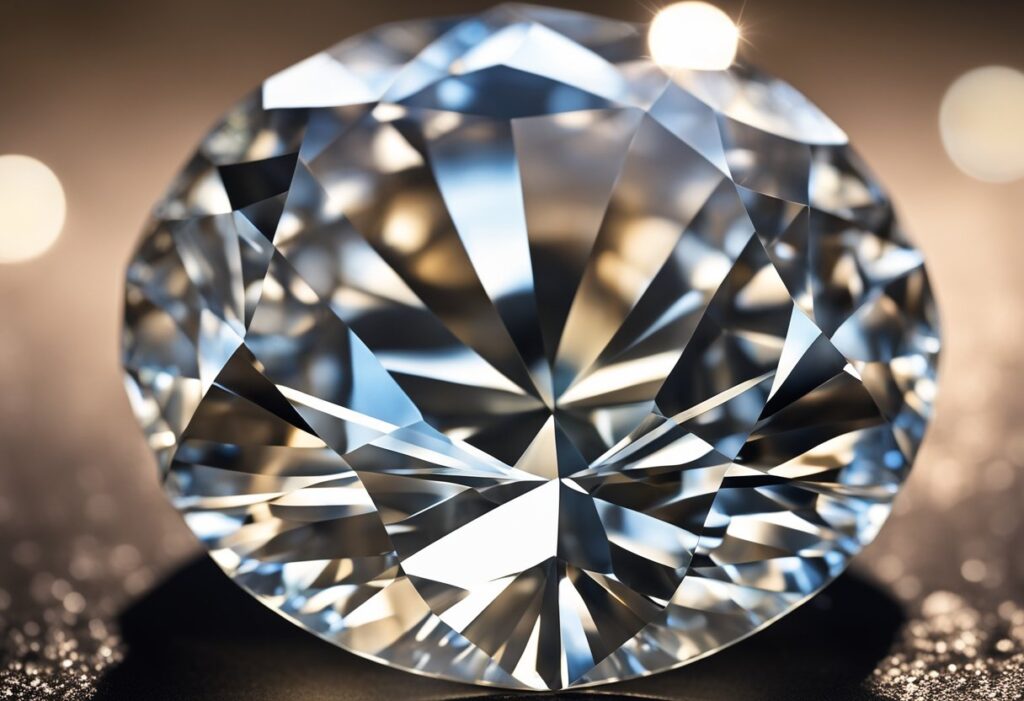
When considering the purchase of a custom engagement ring, it’s important to be armed with the right information. Our guide addresses critical questions regarding timing, costs, and preferences specific to Dallas.
How Far In Advance Should One Typically Purchase An Engagement Ring?
We recommend beginning the process of purchasing a custom engagement ring at least three to six months before your intended proposal date. This timeframe allows sufficient space for consultations, design revisions, and crafting the final piece.
What Is The Best Season To Buy Engagement Rings At A Lower Cost?
To secure engagement rings at a more economical rate, we find the best times are typically after the holiday rush, from January to March, and during late summer when demand often wanes.
What Is Considered The Standard Budget Rule For Purchasing An Engagement Ring?
The commonly cited standard suggests allocating two months’ salary for an engagement ring. However, we advise that you set a budget that feels comfortable for you, as individual financial situations vary greatly.
Are Custom Engagement Rings Generally More Expensive Than Pre-Designed Ones?
Custom engagement rings can be more expensive due to the personalized design and labor involved. Nevertheless, they offer a unique value as they are crafted to your precise vision and specifications.
Which Dallas Stores Are Renowned For The Best Custom Engagement Rings?
In Dallas, Dallas Diamond Factory is known for creating bespoke engagement rings that reflect individual styles and stories.
What Factors Influence The Price Of A Custom Engagement Ring?
The cost of a custom engagement ring Dallas,TX hinges on factors such as the choice of metal, quality and size of the center stone, complexity of the design, and the craftsmanship required. Each element contributes to the ring’s final price.
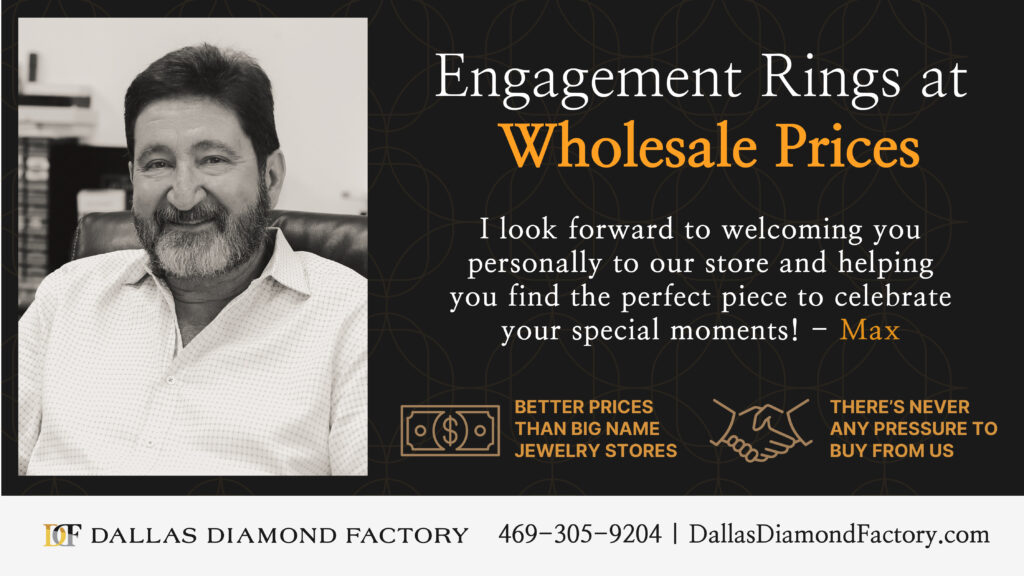
Dallas Diamond Factory is a family owned and operated jewelry store, serving the Dallas,TX area for over 24 years. We’ve had the pleasure of helping thousands of couples their dream diamond ring. If you’re in the DFW area, we’d love to show you our inventory, and provide free diamond education – so that you feel empowered with your purchase. Get in touch with us today for a complimentary appointment.
Visit Our Website: Dallas Diamond Factory
Services: Engagement Rings Dallas, Lab Grown Diamonds, Wholesale Loose Diamonds, Diamond Stud Earrings, Diamond Bracelets,
Loose Diamonds: GIA Certified Diamonds , Oval Diamonds Dallas, TX, Wholesale diamonds dallas
Engagement Ring Services: Engagement rings Highland Park, Engagement rings Plano TX, Engagement rings Preston Hollow , Engagement rings White Rock Lake , Engagement Rings Knox Henderson
Lab Diamond Services: Lab Diamonds Dallas , Lab Diamonds Highland Park, Lab Diamonds White Rock Lake, Lab diamonds Knox Henderson,
Types of Engagement Ring Services: Solitaire Engagement Ring. Three Stone Engagement Ring, Halo Engagement Ring, Pave Engagement Ring, Custom Engagement Ring
5757 Alpha Rd Suite #605A, Dallas, TX 75240
Call us for an appointment at our Dallas Jewelry Store! –> Jewelry Store Dallas, TX
Inside Alpha Tower, 6th Floor (#605A)
Located Near the Galleria mall
As a family-owned Dallas jewelry store, we've served the DFW metroplex for over 20 years. Specializing in engagement rings and wholesale diamonds, we provide expert diamond education to help you make confident, informed choices while maximizing your budget.
5757 Alpha Rd Suite #605A, Dallas, TX 75240
(Located inside Alpha Tower, 6th Floor)
M-F: 9AM-5:30PM
SAT & SUN: CLOSED
Call Us: 469-305-9204